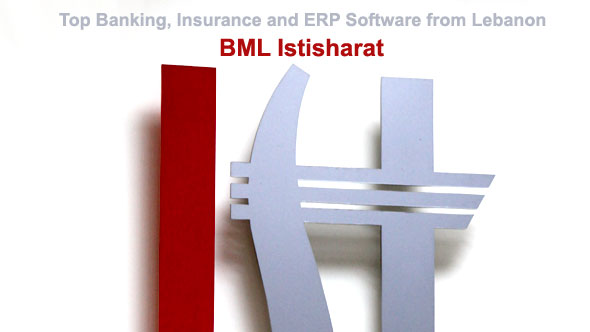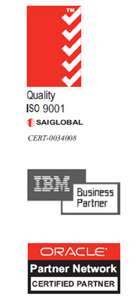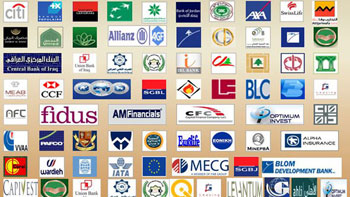Core Banking Software: “Parameterisation, Flexibility, and Adaptation”
As a business hub, Beirut is well-known for its banks, regional conferences and maritime trade, but who knows about the city’s booming IT industry?

Core Banking Software: “Parameterisation, Flexibility, and Adaptation”
Secure and Up to date Banking Software | Secure Software from BML Istisharat
As a business hub, Beirut is well-known for its banks, regional conferences and maritime trade, but who knows about the city’s booming IT industry?
“As you know, Lebanon has no raw materials or natural resources, so IT is typically an industry that can be developed in Lebanon, using the country as a platform,” says Joe Faddoul, Chairman of BML Istisharat, a provider of Banking, Insurance and ERP (Enterprise Resource Planning) software products from Lebanon.
In an exclusive interview with Marcopolis, Faddoul explains how the Lebanese people transformed the apparent weakness into a strength. “The fact that the Lebanese people are multilingual and that they can adapt to different environments is the strenghts of the Lebanese IT industry. It is also possible to be based in Lebanon but to export wherever you want in the world, as there is no need for containers or transport.”

That IT knowledge from the cedar state stands at a high level and has gained enormous reputation in the Middle East. The Dubai Internet City in the United Arab Emirates is home to hundreds of Lebanese ICT firms. Even small Beirut-based web-designers’ homepages and e-payment solutions for clients are in all five continents.
BML Istisharat‘s list of references looks like a “who is who” of the global finance industry. Citibank, Société Générale, Gazprom Bank, Banque Pictet and dozens of other lenders have opted for software solutions from BML. Faddoul says, “The sector is growing- at least, we feel the sector is growing. There are a lot of companies in Europe and the US who are not that visible but are outsourcing their developments in Lebanon.”
BML’s early days, however, were not that promising.
“We started as a consultancy in 1972. Three years later in 1975, the civil war broke out,” Faddoul recalls. “As a direct impact, consultancy went down, but our clients still needed payrolls, so the only activity which remained was the IT sector.” TV images of the destroyed capital of Beirut relayed an image to the world of a country facing standstill, but in contrast to such reminiscences, the business beat went on.
The threat of armed hostilities is the Sword of Damocles hangs over the Lebanese economy. But the resilient Lebanese people have always found ways to keep the money flowing. So did Faddoul and his staff.
BML Istisharat’s list of references looks like a “who is who” of the global finance industry. Citibank, Société Générale, Gazprom Bank, Banque Pictet and dozens of other lenders have opted for software solutions from BML.
“Despite the war, the banking sector flourished, and we followed it by providing the local banking sector with IT solutions,” says Faddoul. “In the early and mid 1980’s, the local currency lost value due to the war, so in order to continue paying our staff decent salaries, we had to “dollarize” the payroll, which meant we had to export.”
Faddoul calls this phenomenon “the main driver for exporting.” BML Istisharat expanded to France and partnered with the IT industry’s top-brands such as IBM, Oracle and HP.
Meanwhile, the company sells to the world. “We eventually succeeded in exporting our insurance products to the US.” With the rise of the Asian tiger states, expanding to the East became a natural choice.
“We just scored our first deal with a local bank in Malaysia, which means our software is up and running in more than 30 countries: in the US, Europe, Africa, the Middle East, and now in Asia. During the next five years our efforts will be focused on Russia, the CIS countries and Asia.”
But although cloud computing is on everyone’s mind in the IT field, BML Istisharat has not jumped on the bandwagon yet simply because “we have not yet found any clients wanting to go into cloud computing with our products. For the time being we are selling and implementing, although some of our clients are using us for outsourcing,” Faddoul explains.
Enterprise Resource Planning, or ERP, on the other hand, is important. “We do ERP for manufacturing SMEs,” says Faddoul. He adds, “In fact, because of the new regulations, banking and insurance are no longer two different planets. Banks in most countries are now allowed to sell insurance products and insurance products are often linked to financial products, so banking and insurance are now heading towards what is called ‘bankassurance’.
In contrast to many global IT firms, BML has no difficulties in finding the right staff. “There are a lot of universities here, including American and French universities as well as local ones, so it is not hard to find the right people,” says Joe Faddoul.
When asked about BML Istisharat’s achievements beyond quarterly results, Faddoul’s pride is obvious. “We have been ranked eighth worldwide by the IBS in the UK and have been selected by Gartner in the magic quadrant.”
Faddoul provides an example of a typical Levantine understatement- a tactic used by people in the orient that manages to win visitors’ hearts and minds. “We are the equivalent of a boutique hotel in the world of IT, banking and insurance; we pamper our clients and build a personal relationship with them.”
Cherishing values like an open-mind, flexibility and a global approach to business are the pillars of the firm’s success. Faddoul himself says, “Parameterising a product means that the end-user can adapt it to his own environment without continuously resorting to us. Most of our products are therefore not hard-coded, but contain the parameters in tables. This means that we are at ease in different markets and our banking product, for example, can run in London and in Mauritania, or in Kuala Lumpur as well as in Paris. Our products run in Arabic, Kurdish, English, Greek, Russian, Dutch, French and so on. The name of the game is parameterisation, flexibility, and adaptation.”
Competition is fierce in the sector for banking software. Temenos from Switzerland, Microlink from Malaysia or Polaris,  to mention a few, from India are likewise expanding in the Middle East and globally. On top that, many banks still develop parts of their software requirements in-house. “Of course, we have the disadvantage of not being able to compete directly with the heavyweights,” Faddoul confesses. “But I think there is a place for both the heavyweight and the boutique. We also try and keep up with the latest developments in banking and insurance, and on the technical side, we try to match the developments in our major platforms, mainly Europe.”
to mention a few, from India are likewise expanding in the Middle East and globally. On top that, many banks still develop parts of their software requirements in-house. “Of course, we have the disadvantage of not being able to compete directly with the heavyweights,” Faddoul confesses. “But I think there is a place for both the heavyweight and the boutique. We also try and keep up with the latest developments in banking and insurance, and on the technical side, we try to match the developments in our major platforms, mainly Europe.”
Nevertheless, Joe Faddoul expects BML Istisharat to flourish. “I can’t predict growth for the IT sector as a whole, but as far as we are concerned, we expect to reach a relative growth rate of around 17-18% annually.” He adds, “There are a lot of companies in Europe and the US who are not that visible but are outsourcing their developments in Lebanon. We are not an outsourcing company – we have developed our own products – but a lot of companies in the wider IT sector are outsourcing their developments in Lebanon, which is good.”
What is his message to potential clients? “I would say to the people looking at software – Try us, it costs nothing and we can do the demos whenever you want.”
News that Lebanon will soon start drilling for oil and gas off the coast of Lebanon is expected to trigger financing requirements worth billions of U. S. dollars. These are good prospects for the Lebanese and their famous love-to-do-business-attitude. And of course, these are good prospects for BML Istisharat.